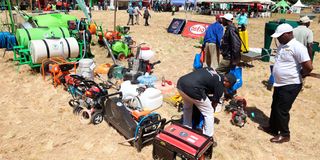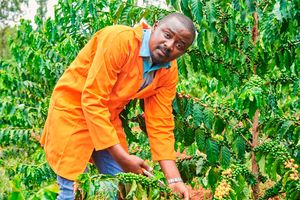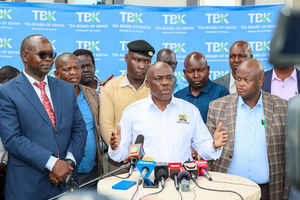
Leah Komen, Business Developer at New KPCU, explains the process of grading of coffee beans during the 2025 Coffee Fair in Ruiru, Kiambu County on February 13, 2025.
Kenya’s coffee is among the world’s best, known for its unique flavour and aroma. As the beverage continues to gain popularity, the government and stakeholders are working hard to transform the sector.
One of the interventions is promoting production through the re-establishment of the Coffee Board of Kenya.
To help transform the industry, the Coffee Research Institute (CRI) and partners organised a fair last week, bringing together farmers and other players, including input companies, researchers, processors, marketers and financial institutions.
Themed “Advancing Agricultural Innovation for Resilient Food Systems and Sustainable Livelihoods”, the 19th edition of the show was at the CRI and Kenya Agricultural and Livestock Research Organisation (Kalro) in Ruiru.
Value-addition and processing are the secrets to profit in farming. Coffeebee Processors Ltd presented an array of brands. Kazuri and Coffeebee Instant are processed by the Syokimau-based company.
“These brands are specialty coffee as they retain the original taste of Kenyan black gold,” said Silas Majani of Coffeebee.
The company is also involved in coffee production, cultivating the crop on more than 1,000 acres in Nyeri County.
“We also have contracted farmers,” he said, adding that the company exports coffee and its products to Turkey, the United States and other countries.
Farmers at the event flocked to the Linkage Africa stand. The company assembles tools and machinery for coffee production.
It showcased an advanced coffee roaster, which, according to Josphat Kyalo of Linkage Africa, is a modern unit for commercial use.
“The roaster is computerised and displays the moisture content and temperature of the coffee beans,” Kyalo said.
He added that the commercial roaster, which costs Sh2.6 million, has a capacity of 90 kilogrammes per hour. It can, however, be adjusted to produce more.
As technology advances, so too should farming. During the fair, the CRI launched a physical plant health clinic, giving farmers an opportunity to interact with experts and plant doctors.

Farm machines on display at Kenya Agricultural and Livestock Research Organisation center in Ruiru, Kiambu county during the 2025 Coffee Fair on February 14, 2025.
The growers presented their concerns with samples and received immediate responses. The approach incorporates photos and videos by farmers to show affected plants and soil.
“Farmers are becoming more tech-savvy, communicating using digital platforms. We are leveraging technology and innovation to offer services,” Getrude Alworah, a plant pathologist at the Institute, said.
She added that the clinic would be expanded to offer digital services. The clinic provided farmers with contacts of experts. The CRI is adopting online platforms to address production challenges.
“The digital approach will be a daily activity, where farmers will share photos and videos of their plants and soil for diagnosis and recommendations,” she said, adding that the approach would reduce costs and save time for farmers seeking expert advice.
Joseph Ndwiga from Embu was among the farmers who engaged the plant doctors, getting immediate responses to his questions.
“Accessing subsidised fertiliser has not been easy. I, however, learnt from the doctors how to supplement my farm with manure,” he said.
Ndwiga has 700 coffee bushes. He harvested 2,100 kilos last year, 600 more than in 2023.
Even though land under the crop has grown, the CRI says prime producing zones are being converted to real estate developments. These include Kiambu, Murang’a, Kirinyaga and Nyeri.
“We have witnessed new regions contributing to the coffee value chain, including Coast, Rift Valley, Western and the Lake Basin, especially near tea and sugarcane-producing zones,” CRI Director Elijah Gichuru said, adding that he is happy with the reforms and the Coffee Bill, 2023.
The Food and Agriculture Authority (AFA) says coffee is grown on 114,000 hectares, an increase from 109,000 a few years ago. Annual production is 38,000 to 50,000 tonnes.
The highest production – 127,000 tonnes – was in 1987. Dr Gichuru believes the country can still hit that number if every coffee tree produces eight to 10 kilos a year.
“The production per tree is approximately two kilos. Some farmers occasionally report getting 30 to 40 kilos per tree,” he told the Seeds of Gold.

New KPCU Deputy Director Muhia Murigi at Kenya Agricultural and Livestock Research Organisation center during the 2025 Coffee Fair on February 14, 2025.
The varieties grown in Kenya are SL 28, SL 32, K7, Ruiru 11 and Batian. Cross-breeding, grafting Arabica and Robusta and adopting tissue culture have led to high-yielding varieties that are resilient to climate change shocks and resistant to pests and diseases.
Kenya exports about 90 per cent of its coffee, with 60 per cent ending up in Europe. New markets are emerging.
“We have seen increased demand from Asia, especially in Japan and South Korea,” said New Kenya Planters Cooperative Union (New KPCU) Deputy Director Muhia Murigi.
New KPCU, a state agency responsible for milling and marketing coffee, guarantees farmers’ produce safety at its warehouses. A farmer receives text messages detailing the quantity supplied, milling status, destination markets and pricing.
Farmers are also benefiting from the Coffee Cherry Advance Revolving Fund, disbursed through New KPCU.
Mr Murigi said more than Sh7 billion has been issued to at least 500,000 farmers. The funds attract a one-time three per cent upfront service fee.
Brazil, Vietnam and Indonesia are the world leaders in coffee production.









